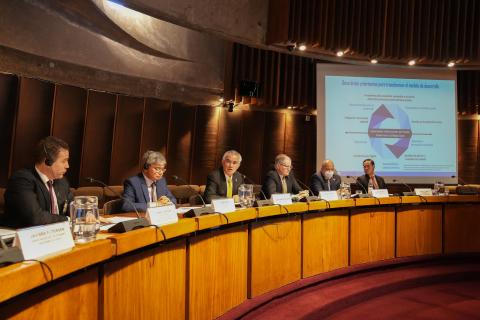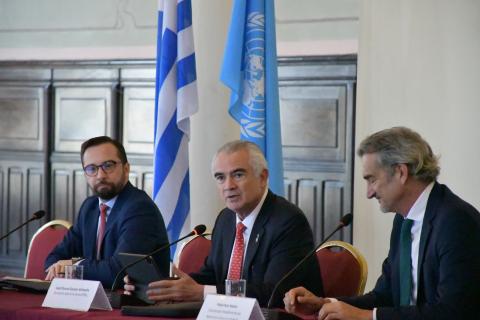Press Release
The development strategy applied by the Commonwealth of Puerto Rico to participate in the changing regional economy should make the most of a legacy of more than four decades of industrialization, at the same time as it strengthens the local foundations of competitiveness.
This is the recommendation included in a summary of the report Evolución de la economía de Puerto Rico, su inserción en un mundo globalizado y lineamientos de política para enfrentar desafíos futuros (Trends in the Puerto Rican Economy, Its Integration in a Globalized World and Policy Guidelines to Face Future Challenges), presented today at the 30th Session of the Economic Commission for Latin America and the Caribbean (ECLAC) being held this week in Puerto Rico. The study was prepared by the head of the country's State Department, in cooperation with this body and specialists at the University of Puerto Rico.
The report notes that industrial policy must go hand in hand with external integration, but in a regional and global context that is more open to trade and involves more pressing competition. More attention should be given to exports, not only of already successful high technology manufactured goods, but also those from other sectors, which in the past did not reach international markets. Some of these could enjoy comparative advantages.
The report warns that although a significant manufacturing base, competitive in many areas, has been established, the limits on its influence throughout the rest of the economy and employment have also become apparent, with the unemployment rate remaining high for several years. The strategy of forming strategic clusters in high-technology industries - not only manufacturing but also services - has placed the emphasis on inter-industrial links and identifying local capital as an important actor in the process.
Puerto Rico has achieved a modern, highly competitive economy in the manufacturing and service segments. However, it has not been as successful in forming inter-industrial links with locally financed companies and, although there is evidence of technology transfers at the microeconomic level - both through local firms' use of state-of-the-art technologies and human resource training, especially at the professional and managerial levels - it has not created a national system for innovation.
This experience also indicates that inter-industrial links and technology transfers, which are among the main potential benefits of attracting manufacturing capacity from abroad, are not necessarily automatic, but rather require public policies to make them possible and promote them.
The study indicates that in its early developmental phases, inclusion within the United States' tariff system protected the Puerto Rican economy from competition from third countries. More recently, Puerto Rico has had to adjust to more "openness without protection", as US markets have undergone different trade liberalization processes.
The report recommends analyzing the structure of comparative advantages that Puerto Rico appears to enjoy in some service activities, such as finance, insurance and real estate, engineering, communications and business support services (auditing and consulting). Potential service exports to the countries of Central America and the Dominican Republic should be evaluated, as these can take advantage of the opportunities offered by the Free Trade Agreement between the United States and the countries of Central America (US-CAFTA), plus the Dominican Republic. The country should also explore other export opportunities present in this agreement.
The report warns, however, that Puerto Rico must also examine its weaknesses in light of this agreement, since it could involve certain challenges to agriculture, a source of employment in some parts of the country.
On the Free Trade Agreement of the Americas (FTAA), the report notes that possible negative effects should not be major, since foreign trade with the United States is already very open. However, it notes that the US still has relatively high tariffs on several industries, including some that are very labour-intensive, with enormous presence in Puerto Rico. The country therefore is exposed in sectors where cuts to tariff barriers will be deepest (clothing and textiles, leather goods, processed foods, products of stone, ceramics and crystal, and tobacco products).
Corrections to the Developmental Strategy
The report compares Puerto Rico's social and economic development with the United States and countries of Latin America and the Caribbean, exploring the unique qualities of the Puerto Rican developmental model compared to the rest of the region, and offering some useful elements for designing development policies and instruments.
Puerto Rico's experience illustrates the need to correct the developmental strategy from time to time, to adapt to a changing environment. The factors determining competitiveness change; in Puerto Rico's case they have been mainly influenced by shifts in wage costs, fiscal incentives' fading ability to promote industrialization, and the growing importance of competition from third countries for markets in the United States.
The document Evolución de la economía de Puerto Rico, su inserción en un mundo globalizado y lineamientos de política para enfrentar desafíos futuros (Trends in the Puerto Rican Economy, Its Integration in a Globalized World and Policy Guidelines to Face Future Challenges) will soon be published in book form. This work was enriched through consultation with public and private sector, civil society and union representatives.
ECLAC's 30th Session is taking place in San Juan, Puerto Rico from 28 June to 2 July 2004, with participation from more than 300 delegates from 41 member and seven associate states belonging to this regional United Nations commission, along with representatives from United Nations specialist bodies, non-government organizations and special guests.



